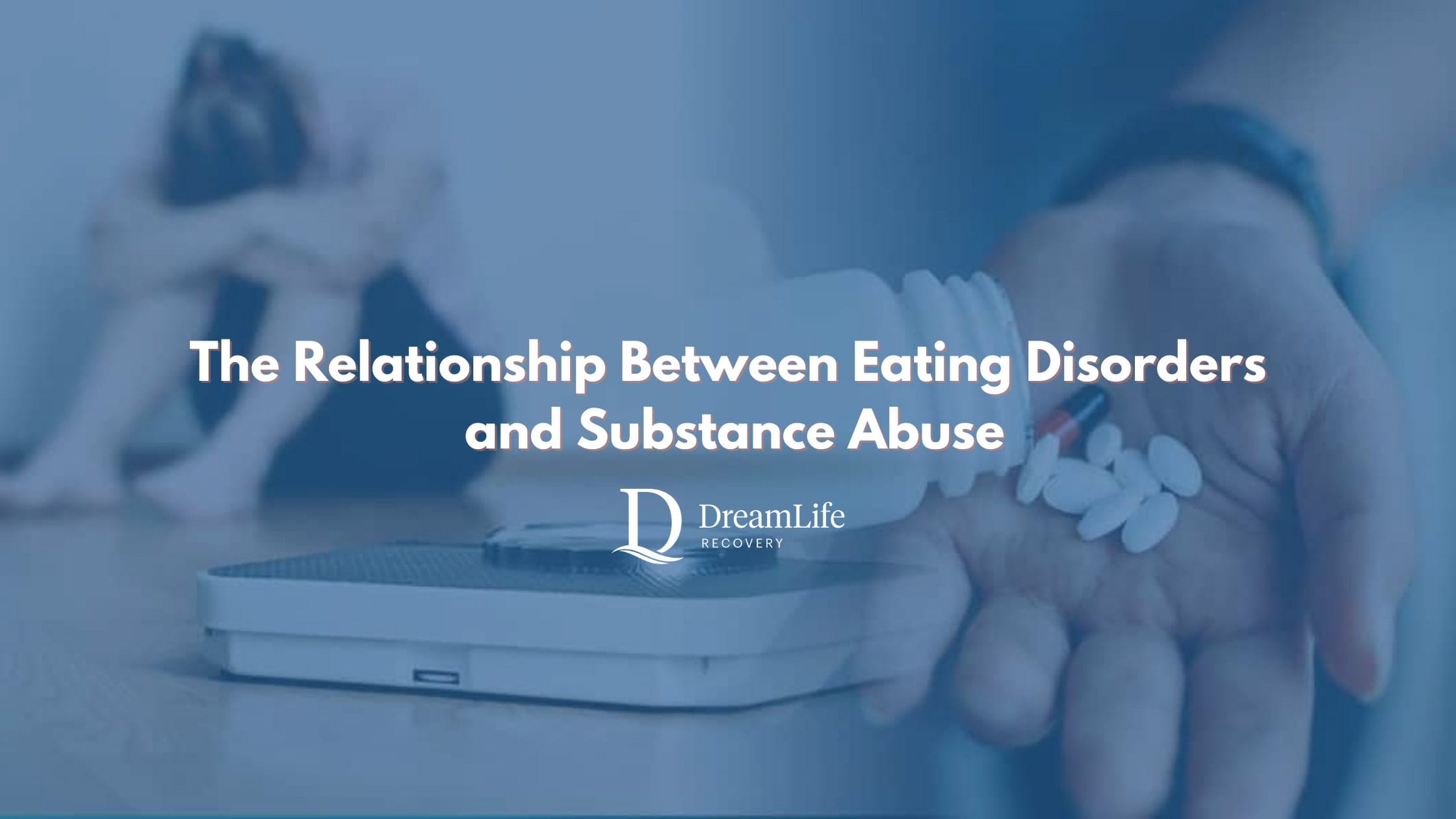The Relationship Between Eating Disorders and Substance Abuse


Written By
DreamLife RecoveryIt may not seem obvious why people struggling with eating disorders would develop an alcohol or drug addiction, but there may be a strong link between the two. Eating disorders generally involve problematic dietary habits and unhealthy relationships with food, eating, and body image, while substance use disorders involve problematic alcohol or drug consumption habits that prolong, despite negative consequences.
The relationship between substance abuse and eating disorders may relate mainly to the underlying causes that fuel both conditions. Genetic and biological factors can predispose a person to develop disordered eating and substance abuse habits, and psychological and environmental conditions may contribute the progression of these disorders. Eating disorders and substance use disorders have a high prevalence rate, and treating them together can be challenging but is critical to recovery.
What is an Eating Disorder?
Eating disorders are generally marked by compulsive behaviors, loss of control over behavior, and the continuation of unhealthy eating habits despite negative consequences. There are three types of disorders and other disordered eating patterns.
- Anorexia Nervosa – Anorexia Nervosa centers on a desire to be extremely thing, causing the person to severely restrict their calorie intake, sometimes accompanied by excessive exercising to keep weight down. Anorexia Nervosa can cause serious health consequences like nutritional deficiencies, debilitating anemia, loss of bone mass, and cardiac issues. The mortality rate is 10% for those with anorexia due to death by starvation, electrolyte imbalance, or suicide.
- Bulimia Nervosa – Bulimia Nervosa involves a pattern of overeating or binge eating followed by purging—forcing oneself to throw up the food or using laxatives, diuretics, and enemas. Other compensatory behaviors include excessive exercise and severe calorie restriction. Bulimia can cause tooth enamel decay, nutritional deficiencies, and dangerous electrolyte imbalances. More serious health consequences include gastric and esophageal complications and cardiac issues.
- Binge Eating Disorder – Binge Eating Disorder involves eating to excess without purging or compensatory behaviors, which can cause sufferers to become obese. Obesity can lead to serious health consequences such as type 2 diabetes, high blood pressure, heart disease, stroke, cancer, liver and gallbladder problems, osteoarthritis, and reproductive issues.
Other disordered eating behaviors include orthorexia, when a person is obsessive about eating a healthy diet, leading them to restrict entire food groups or limit calories. There is another pattern of behavior termed drunkorexia, in which people, particularly young people, will restrict their food intake to compensate for the calories they will consume in the form of alcohol. Another behavior is compulsive overeating is when a person occasionally binge eats without purging or compensating for the excess consumption. Unlike Binge Eating Disorder, compulsive overeating occurs less frequently and may not result in obesity, although it can contribute to significant weight gain.
The Link Between Eating Disorders and Substance Abuse
Research has only scratched the surface on the link between eating disorders and substance abuse. Studies have found that people with eating disorders have higher rates of co-occurring substance use disorders, and a review done in 2010 found that women with an eating disorder or a substance use disorder have a much higher chance of developing the other disorder—more than four times as likely as other women.
There are many theories about the link between eating disorders (ED) and substance use disorders (SUDs), but factors that lead to the development of both conditions can include:
- Low self-esteem and vulnerability to outside pressures
- Early childhood traumas or abuse
- Onset may be triggered by stressful or traumatic experiences
- Both EDs and SUDs affect brain chemistry, particularly dopamine and serotonin
- Co-occur with mental health conditions like depression and anxiety
- Family history of EDs and SUDs can predispose people to develop them
Eating disorders that co-occur with substance abuse can lead to a situation that makes both conditions more severe and potentially life-threatening because of the compounding of physical and mental health complications.
Treatment for Co-occurring Eating Disorders with Substance Use Disorders
Eating disorders are serious because of the associated health complications, and when these are combined with substance abuse or addiction, the consequences can be dire. It requires a professional team with specialty training to treat both conditions simultaneously.
There are few addiction treatment facilities with specialists who treat eating disorders, and likewise, facilities that treat eating disorders do not always have people with training in substance use disorders. While that is changing, the current reality is that many people struggling with both eating disorders and substance use disorders may have to treat both conditions separately, determining and prioritizing the more critical condition with the help of a medical professional.
DreamLife Recovery does not have eating disorder treatment specialists on staff, but our highly trained team of clinicians will monitor for signs of unhealthy eating behaviors or attitudes towards food during treatment. If during the course of treatment we find that someone in our care shows signs of an eating disorder, we may refer them out to a specialist who can provide them with the help they need. We do focus on ensuring that our clients receive high quality nutrition and learn about the importance of maintaining a healthy lifestyle, which includes diet and exercise.
Resources:
- Substance Abuse and Eating Disorders – National Eating Disorders Association
- “Eating Disorders and Substance Abuse” – Muhlheim, Lauren, PsyD, CEDS; Rev. by Steven Gans, MD; VeryWellMind, 18 March, 2019
- “Eating Disorders and Alcohol Use Disorders” – Carlos M. Grilo, Ph.D., Rajita Sinha, Ph.D., and Stephanie S. O’Malley, Ph.D.; National Institute on Alcohol Abuse and Alcoholism






